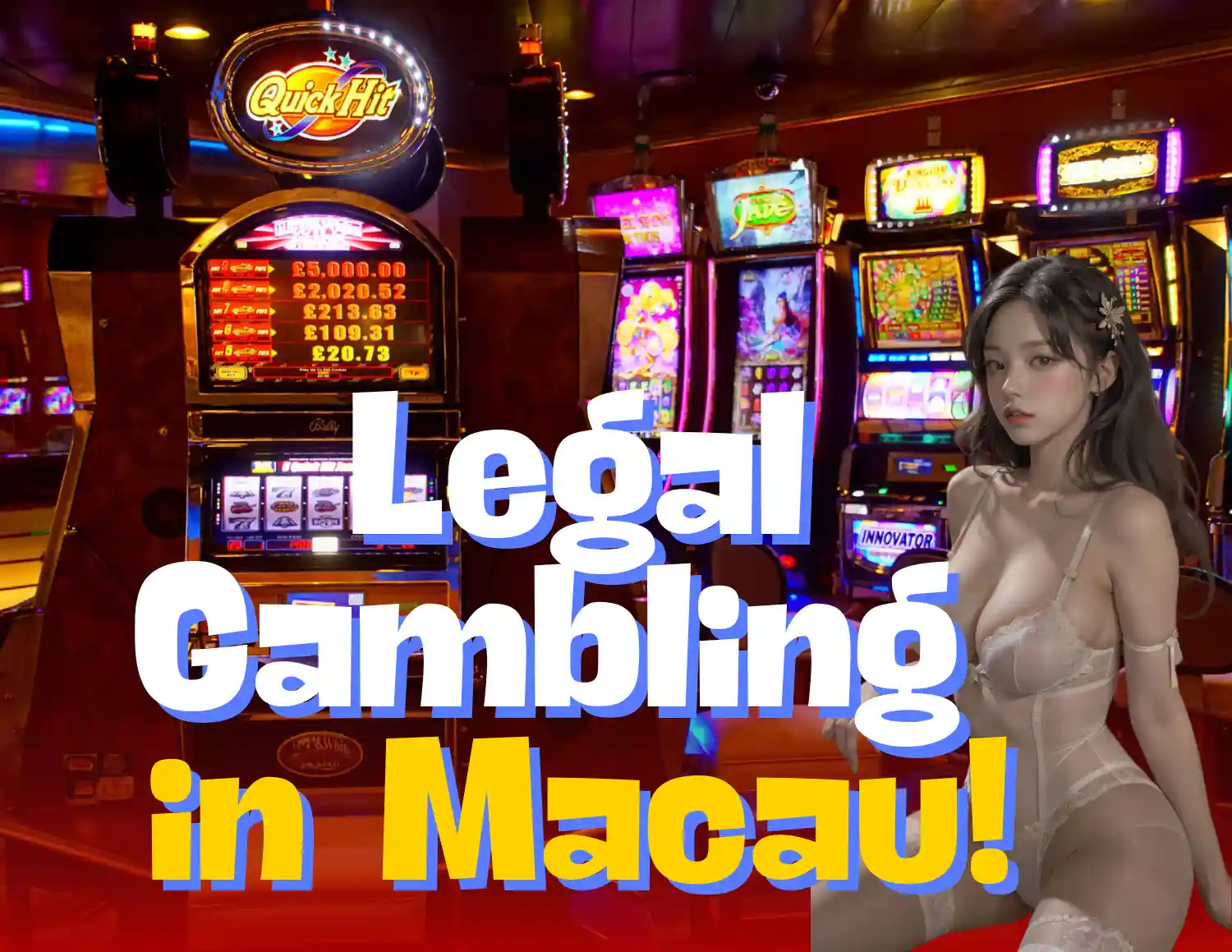Legal Gambling in Macau
Macau, a former Portuguese territory and now a Special Administrative Region of China, has long been known as the “Las Vegas of Asia.” The city’s history with gambling dates back centuries, and it has evolved into a thriving hub for legal gambling activities, offering a diverse range of casino games and other forms of legalized betting.
In this detailed article, we will dig into the intriguing history, regulatory framework, types of legal gambling, the impact on society and the economy, and responsible gambling measures in Macau. This in-depth exploration will provide a well-rounded understanding of the legal gambling landscape in this unique and captivating region.

Historical Context
The Portuguese Influence on Gambling in Macau
Macau’s history with gambling can be traced back to the 16th century when the Portuguese established a colony on the Iberian Peninsula. The Portuguese brought a penchant for gambling, gradually reaching Macau. The city’s strategic location serves as a hub for trade and commerce. Made it an attractive destination for those seeking business and leisure opportunities.
As the Portuguese presence in Macau solidified, so did the gambling industry. The first documented evidence of legalized gambling in Macau dates back to 1847 when the government granted a monopoly to a single gambling operator. This move paved the way for the development of Macau’s gambling ecosystem, which would eventually become one of the most significant contributors to the local economy.
Evolution of the Gambling Industry in Macau
Over the centuries, the gambling industry in Macau has undergone a remarkable transformation. From humble beginnings as a hub for traditional Chinese gambling activities, such as fan-tan and patio, Macau has evolved into a global powerhouse, rivaling even Las Vegas’s gaming revenue.
The turning point in Macau’s gambling history came in the 1960s, when the government awarded a monopoly concession to the Sociedade de Turismo e Diversões de Macau (S.T.D.M.), led by StaS.T.D.M. Ho. This decision ushered in a new era of casino development and expansion, with the construction of iconic gaming establishments like the Grand Lisboa and the Sands Macau.
The liberalization of the gambling industry in the early 2000s, with new concessionaires and sub-concessionaires, further propelled Macau’s rise as a global gambling hub. Today, Macau is home to some of the world’s largest and most technologically advanced casinos, attracting millions of visitors yearly and rendering billions of dollars in gaming revenue.
The Shift Towards Diversification
Macau has made a concerted effort to diversify its gambling industry in recent years, moving beyond the traditional casino-centric model. This shift has been driven by government initiatives and industry-led efforts to create a more well-rounded tourism and entertainment ecosystem.
One of the key developments in this diversification process has been integrating non-gaming elements into the casino resorts. These include luxury hotels, high-end shopping, fine dining, and various leisure and entertainment options like live shows, theme parks, and convention facilities. This approach aims to attract a broader range of visitors, not just those primarily interested in gambling.
Additionally, Macau has sought to promote the development of the Meetings, Incentives, Conferences, and Exhibitions (M. I.C.E.) sector, leveraging its world-class gaming and hospitality infrastructure to position itself as a premier destination for business events and conferences.
Regulatory Framework
Overview of the Current Legal Framework
Macau’s gambling industry is governed by a comprehensive legal framework that provides a clear and well-defined structure for regulating and overseeing various gambling activities. The primary legislation governing the gambling industry in Macau is the Gambling Law, which was first enacted in 1961 and has undergone several amendments over the years to keep pace with the industry’s evolution.
The Gambling Law establishes the fundamental principles and guidelines for operating casinos, lotteries, and other forms of legalized gambling in Macau. It outlines the licensing requirements, the responsibilities of gambling operators, and the regulatory bodies tasked with overseeing the industry.
Licensing and Regulatory Bodies
The Macau S.A.R. Government, through its various administrative and regulatory bodies, plays a vital role in the oversight and management of the gambling industry. The critical regulatory bodies involved in the licensing and supervision of gambling activities in Macau include:
- Gaming Inspection and Coordination Bureau (D.I.C.J.): The DID.I.C.J.e primaD.I.C.J.egulatory agency responsible for licensing, supervising, and inspecting gambling operators in Macau. It ensures compliance with the Gambling Law and other relevant regulations.
- Monetary Authority of Macau (A.M.C.M.): The A.M.C.M. iA.M.C.M.sponsibA.M.C.M. directs the financial aspects of the gambling industry, including the monitoring of cash flow, anti-money laundering measures, and the economic stability of gambling operators.
- Public Security Police Force (C.P.S.P.): The C.P.S.P. iC.P.S.P.sponsibC.P.S.P. or maintaining public order and safety within gambling establishments and investigating and addressing criminal activities.
These regulatory bodies work in tandem to ensure the integrity, transparency, and responsible management of the gambling industry in Macau while protecting the interests of both the operators and the general public.
Laws and Regulations Governing Gambling Activities
The legal framework governing gambling activities in Macau is extensive and protects a wide range of activities, including:
- Casino Gaming: The Gambling Law and its accompanying regulations outline the requirements for the establishment and operation of casinos, including licensing, game offerings, and operational standards.
- Lotteries: The Macau lottery market is controlled by separate laws and regulations. Which covers the different types of lottery games, licensing, and the responsibilities of lottery operators.
- Sports Betting: Macau permits certain forms of sports betting, primarily on horse racing and greyhound racing. Specific laws and regulations govern the regulatory framework for sports betting.
- Junket Operations: The Gambling Law also addresses the activities of junket operators, who facilitate the flow of high-roller gamblers from mainland China to Macau’s casinos. Junket operations are subject to specific licensing and regulatory requirements.
- Anti-Money Laundering Measures: Macau has implemented stringent anti-money laundering (A.M.L.) regulations, requiring gambling operators to implement robust due diligence and reporting procedures to prevent the exploitation of the gambling industry for illicit financial activities.
This comprehensive legal framework, along with the active enforcement by the regulatory bodies. It has played a vital role in preserving the goodness and stability of Macau’s gambling industry.
Types of Legal Gambling
Macau’s gambling landscape encompasses a diverse array of legal gambling activities, catering to a wide range of preferences and interests. Macau offers a rich tapestry of gambling opportunities. From the iconic casino gaming experience to emerging forms of legalized betting.
Casino Gaming
Casino gaming is undoubtedly the backbone of Macau’s gambling industry. The city has some of the world’s largest and most opulent casino resorts. Offering an expansive display of gaming tables and slot machines. The most popular casino games in Macau include:
| Game | Description |
| Baccarat | This card game is the most popular and lucrative in Macau’s casinos, accounting for most gaming revenue. |
| Roulette | It is a classic casino game where players bet on a spinning wheel’s result. |
| Blackjack | It is a card game where players aim for a hand value closer to 21 than the dealer. |
| Slot Machines | Electronic gaming machines that offer a diverse range of themes and gameplay. |
| Sic Bo | It is an ancient Chinese dice game that has gained popularity in Macau’s casinos. |
Lottery and Sports Betting
In addition to the thriving casino gaming sector, Macau offers legal lottery and sports betting options. The Macau Lottery, operated by the Macau Welfare Lottery, delivers a variety of lottery games, including the famous “Welfare Lottery” and “Instant Lottery.” Sports betting, primarily on horse racing and greyhound racing, is also available through authorized operators.
Emerging Trends and Innovations
As the gambling industry in Macau continues to evolve, new and innovative forms of legal gambling are emerging. These include:
- Electronic Table Games: Casinos are integrating electronic versions of traditional table games, such as electronic roulette and baccarat, to cater to the growing demand for technology-driven gaming experiences.
- Integrated Resorts: Macau’s casino operators are increasingly focusing on developing integrated resort complexes, which combine gaming with a wide range of non-gaming amenities. Including hotels, shopping, dining, and entertainment options.
- eSports and Virtual Sports: Macau is exploring the potential of eSports and virtual sports betting, leveraging the increasing popularity of these emerging forms of gambling among younger demographics.
These developments and the ongoing diversification efforts are shaping the future of legal gambling in Macau. Ensuring that the city remains at the forefront of the global gambling industry.
Impact on Society and Economy
Macau’s legal gambling industry has had a profound impact on the city’s society and economy. Transforming it into a global hub for gaming and tourism.
Contribution to the Local Economy
The gambling industry is the backbone of Macau’s economy, accounting for a considerable portion of the city’s Gross Domestic Product (G.D.P.) and employment. In 2019, before the COVID-19 pandemic, Macau’s gambling revenue reached a staggering $36.5 billion. Surpassing the combined gambling revenues of Las Vegas, Singapore, and other major gaming destinations.
The gambling industry’s contribution to Macau’s economy extends beyond its direct impact on gaming revenue. It has also generated many jobs, with the casino resorts and ancillary businesses employing a significant portion of the local workforce. Additionally, the industry has attracted considerable foreign investment. This has led to developing world-class infrastructure and promoting Macau as a premier tourism destination.
Social and Cultural Impact
The gambling industry’s influence on Macau’s social and cultural landscape is multifaceted. On one hand, the industry has brought economic prosperity and improved many residents’ living standards. The influx of tourism has also exposed Macau to diverse cultures and traditions, fostering a more cosmopolitan outlook.
However, the dominance of the gambling industry has also raised concerns about its impact on social well-being. Issues such as problem gambling, addiction, and the prospect of increased crime and social instability have been the subject of ongoing discussions and policy interventions.
To address these concerns, the Macau government and the gambling industry have implemented various measures to promote responsible gambling and support individuals and communities affected by the negative consequences of gambling. These include:
- Establishing gambling addiction treatment centers and counseling services
- Implementing restrictions on casino access for specific demographics, such as minors and problem gamblers
- Collaborating with non-profit organizations to raise awareness and provide support for those struggling with gambling-related issues
Responsible Gambling Measures
Macau’s commitment to responsible gambling is evident in the various initiatives and programs implemented by the government, industry, and non-profit organizations to promote a sustainable and socially responsible gambling ecosystem.
Regulatory Oversight and Enforcement
Through the Gaming Inspection and Coordination Bureau (D.I.C.J.), the government has implemented a complete regulatory framework to ensure the responsible operation of gambling activities. This includes:
- Strict licensing requirements and ongoing supervision of gambling operators
- Enforcing regulations related to underage gambling, problem gambling, and anti-money laundering measures
- Collaborating with the industry to develop and implement responsible gambling best practices
Industry-led Initiatives
Gambling operators in Macau have also taken proactive steps to promote responsible gambling. These initiatives include:
- Implementing self-exclusion programs that allow individuals to exclude themselves from casino premises voluntarily
- Providing employee training on identifying and assisting problem gamblers
- Offering educational resources and support services for patrons on the risks and responsible management of gambling
Collaboration with Non-profit Organizations
Macau’s responsible gambling efforts also involve collaboration with non-profit organizations and community groups. These partnerships have led to the development of various support services and public awareness campaigns, such as:
- Gambling addiction treatment and counseling services
- Educational programs targeting vulnerable groups. Such as youth and the elderly
- Awareness campaigns to destigmatize problem gambling and promote healthy gambling habits
The ongoing cooperation between the government and industry. Non-profit organizations underscore Macau’s commitment to promoting a responsible and sustainable gambling environment that balances economic benefits with social well-being.
Conclusion
Macau’s legal gambling industry has evolved significantly over the centuries, transitioning from a hub for traditional Chinese gambling activities to a global powerhouse in the world of gaming and entertainment. The city’s unique history and comprehensive regulatory framework. Diverse legal gambling offerings have made it a premier destination for domestic and international visitors.
While the gambling industry has undoubtedly contributed to Macau’s economic prosperity. The government and industry stakeholders have also recognized the importance of addressing the potential social and ethical challenges associated with gambling. The implementation of responsible gambling measures and collaboration with non-profit organizations. And ongoing efforts to diversify Macau’s tourism and entertainment offerings demonstrate a commitment to striking a balance between economic growth and social well-being.
As Macau continues to navigate the ever-evolving landscape of the gambling industry, its ability to adapt and innovate. Maintaining a responsible approach will ensure the long-term sustainability and success of this unique and captivating gambling hub.









